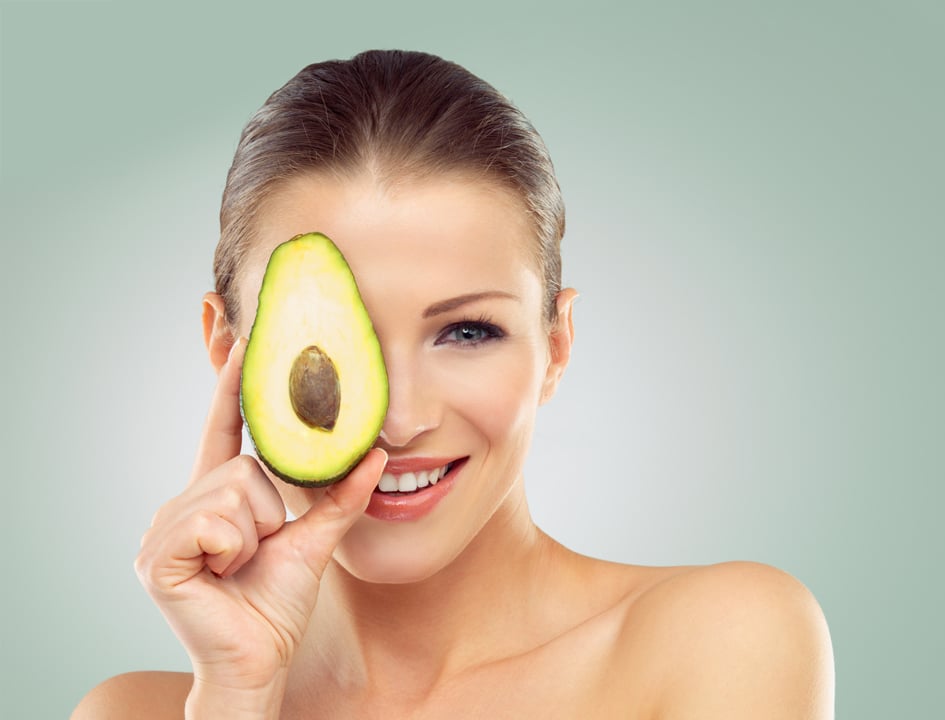written by:
reviewed by:

Here are some of our favorite foods for healthy skin that you can easily and affordably add to your grocery list for long-term skin health.
Most of us already know that a thorough daily skin-care routine will help keep skin looking fresh and clear on the outside. You probably have a large variety of your favorite products on-hand that you use to cleanse your face and body. However, for truly healthy skin, the process needs to start from the inside.
Whether you suffer from acne, find annoying blemishes from time to time, or just want to maintain a radiant-looking glow, you can ramp up your skin-care efforts by adding nutrients to your diet that are known to fight free radicals, delay the aging process, and help repair already-done damage — all while providing delicious ingredients for your meals in the process. Plenty of foods can provide these benefits, but here are some of our favorite staples that you can easily and affordably add to your grocery list for long-term skin health.
Sweet Potatoes
Although a food described as a “starchy tuber” doesn’t sound like it would be good for you, this root vegetable is a top contender in the foods for healthy skin category.
Sweet potatoes have a nutritional profile that’s hard to beat — they’re high in fiber, and supply ample amounts of vitamin A, vitamin B6, vitamin C, vitamin D, iron and potassium. Additionally, the orange color tells you that you will benefit from its carotenoids. Carotenoids are known for their antioxidant function, which means they can help fight the damage your skin suffers via environmental free radicals and other cancer-causing agents. These anti-inflammatory properties are exactly the type of thing you need to protect your largest organ from toxins.
Sweet potatoes also taste fantastic, can be prepared in diverse ways and are low in calories to boot. As another bonus, sweet potatoes have a low glycemic index, which means they will prevent your blood sugar from spiking, keeping you fuller, longer and allowing your blood sugar to increase more gradually after you’re done eating.
Some suggest that boiling sweet potatoes allows for the best chance of antioxidant retention, but you can also bake, sauté and grill your sweet potatoes to taste — as long as you’re eating them! Make sure to keep the skin on, as the peel holds a significant amount of nutrients over the fleshy part of the sweet potato.
Avocado
Another great food for healthy skin is avocado. An a-list celebrity of the superfood world. By now, most people know all about its numerous benefits—but that doesn’t mean the hype is undeserved. The poly- and monounsaturated fat content are the healthy fats that you keep hearing about when people say “good fat.” One avocado (from California) contains 15 grams of total fat and 10 grams of monounsaturated fat. Not to be confused with polyunsaturated fats in omega-3 fatty acids, avocados contain mostly monounsaturated fats—which contribute to low cholesterol levels.
Helping to repair damaged skin cells and reduce inflammation, avocados allow for more water retention in the first layer of skin because they too hold antioxidant/carotenoid properties. Avocados are also known to act as a nutrient booster. This means they can help your body better absorb important nutrients from other foods—a double bonus for your skin.
Avocados are easy to love, despite their somewhat high-calorie count. Their versatile nature allows you to use them in a variety of ways. You can eat them raw, use them in smoothies, add them to cooked dishes or sandwiches, and even apply them directly to your skin in a homemade face mask.
Coconut Oil
The coconut oil craze is happening for a very good reason. If you thought sweet potatoes and avocados were versatile, the uses for coconut oil and its benefits have them beat like Usain Bolt in the 2016 Summer Olympics.
The sweet oil is produced from the “meat” of coconuts that are harvested from mature coconut palms. You can cook with coconut oil, eat it raw (if you dare) or apply it directly to your skin for an effective moisturizer.
Although it has a high saturated fat content and a low monounsaturated fat content, coconut oil is mostly made up of medium-chain triglycerides (MCTs for short). Many studies have seen an association between MCTs and greater satiation, which may contribute to weight control/loss. However, not all coconut oils are created equal. Look for unrefined, virgin coconut oil to ensure that you don’t buy coconut oil that has been bleached or is partially hydrogenated.
Unrefined, virgin coconut oil holds antioxidant properties that will benefit your skin due to its phenolic compounds. Coconut oil has also been shown as an effective way to reduce inflammation from acne, heal minor wounds and act as a treatment for a variety of candida species—which means it can act as an anti-fungal and anti-bacterial agent.
Chia Seeds
Chia seeds have an incredible amount of fiber (10 grams per ounce), contain a large amount of protein (about 5 grams per ounce) and healthy fats (about 9 grams per ounce).
Additionally, chia seeds have omega-3 fatty acids and antioxidants, which will aid your skin in the quest for healthy aging by fighting free radicals through the presence of phenolic acid. They also contain calcium, manganese, magnesium, phosphorus, zinc, vitamin B1, B32, B3. and potassium.
The party trick of chia seeds is that they can gelatinize themselves when submerged in liquid for a few hours—providing you with a healthy and filling addition to your homemade smoothies, pudding, salads, or baked goods.
Although more research is needed regarding the full array of benefits that chia seeds provide, the known benefits make them a healthy addition to your diet that your skin will thank you for.
Tomatoes
Tomatoes don’t get the attention they deserve when it comes to the “superfood status” that gets thrown around a lot in the media. But it’s packed with antioxidants and belongs on the foods for healthy skin roster.
The truth is, regular consumption of tomatoes has been shown to decrease the risk of heart disease and stroke.
Additionally, a variety of antioxidants and compounds work to provide your body with lycopene, ascorbic acid, beta-carotene, flavonoids, phenolic acids, and vitamins A, C and E—all of which contribute to skin that flourishes by building up collagen and maintaining elasticity.
Lycopene, the antioxidant all-star, is more easily digested by the body when tomatoes have been cooked.
If you’re feeling creative, you can use tomatoes in a homemade face mask. The acidity is said to have natural astringent properties for even the most sensitive of skin.
Turmeric
Although not technically a food, but rather a spice, turmeric is a heavy hitter when it comes to the realm of anti-inflammatory properties and disease reversal.
You probably know it as the main ingredient in curry, but this spice packs a lot of punch in a variety of other ways. It has long been associated with the potential to prevent and/or treat inflammatory conditions such as indigestion, heart attack, stroke, diabetes, Alzheimer’s disease, and some cancers. Although nothing has been proven, curcumin (the active ingredient in turmeric) has shown promising results in early studies.
Applying turmeric directly to the skin has been shown to clear acne scars due to its antioxidant, anti-inflammatory and antiseptic properties. You can even combine turmeric with the foods mentioned above for extra health.
Photo ©iStockPhoto
The information provided on Health Food Radar is intended for general informational purposes only. While we strive to offer accurate and up-to-date content, we do not provide medical advice, diagnosis, or treatment. Always consult with a qualified healthcare professional before making any dietary or lifestyle changes, especially if you have underlying health conditions or concerns.



